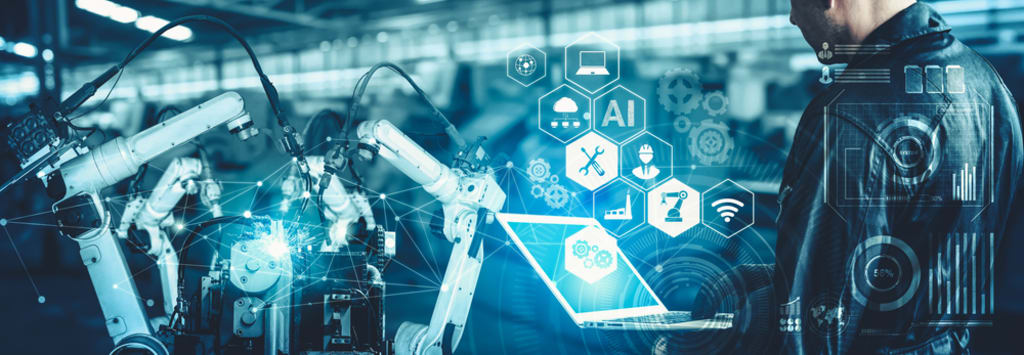5 Ways AI Software Is Revolutionizing Business Operations
By Jeff Parcheta

Artificial Intelligence (AI) has emerged as a transformative force in business operations, revolutionizing how companies operate and thrive. By utilizing progressed calculations and AI strategies, artificial intelligence programming empowers organizations to saddle the force of information, robotize processes, customize client encounters, improve network safety, and expand the abilities of their labor force. In this part, we will dig into the definition and meaning of artificial intelligence programming in business tasks, trailed by a short outline of the five key ways it reshapes organizations today.
##Definition and Significance of AI in Business Operations
AI software refers to computer programs and algorithms designed to simulate human intelligence and perform tasks that typically require human cognition. It incorporates errands, for example, information examination, design acknowledgment, direction, and critical thinking. Overwhelmingly of information, simulated intelligence programming can recognize designs, make expectations, and gain, empowering organizations to acquire significant bits of knowledge and streamline their tasks.
The significance of AI in business operations cannot be overstated. It allows organizations to investigate complex informational collections rapidly and precisely, robotize dull undertakings, further develop dynamic cycles, customize client encounters, upgrade network safety gauges, and engage representatives to work all the more productively. By utilizing simulated intelligence programming, organizations can open new open doors, gain the upper hand, and drive extraordinary development.
##A Brief Overview
1. Enhanced Data Analysis and Insights: AI enables associations to process and separate huge volumes of data continuously, uncovering models, models, and snippets of data that were at one point excessively far. It engages relationships to seek after information-driven choices, further develop works out, and perceive new business open doors.
2. Streamlined Business Processes and Automation: AI robotizes dull and conventional endeavors, saving crucial time for workers to zero in on additional essential exercises. Through motorizing processes, affiliations can increment feasibility, decline goofs, and accomplish huge expense hold saves.
3. Personalized Customer Experiences: AI allows organizations to determine client inclinations, conduct, and needs on a singular level. By utilizing this data, affiliations can pass on modified proposals, relegated advancing undertakings, and hand-made client encounters, further creating buyer faithfulness and dependability.
4. Enhanced Cybersecurity and Risk Mitigation: AIassumes a significant part in shielding organizations against digital dangers. Through state-of-the-art computations and simulated intelligence, man-created insight can see anomalies, perceive likely dangers, and proactively ease security breaks, supporting affiliations' overall association protection position.
5. Augmented Workforce and Collaboration: AIcomplements human insight and improves the abilities of the labor force. Through motorizing routine undertakings, giving snippets of data, and working with support, reproduced information programming attracts agents to work much more helpfully, settle on informed choices, and accomplish additionally created results.
##Enhanced Data Analysis and Insights
###Introduction to AI-powered Data Analysis
Information examination is a fundamental part of business activities, giving important experiences into client conduct, market patterns, and functional productivity. Be that as it may, customary information examination strategies are often tedious, blunder-inclined, and restricted in scope. Artificial intelligence-fueled information examination has arisen as a useful asset to defeat these difficulties, empowering organizations to process and investigate enormous volumes of information rapidly and precisely.
###Use of AI Algorithms for Real-Time Data Processing and Pattern Recognition
Artificial intelligence calculations are intended to distinguish examples and connections in information, giving organizations significant bits of knowledge that would somehow or another slip by everyone's notice. By utilizing these calculations, organizations can handle immense information measures continuously, empowering them to pursue informed choices rapidly. Simulated intelligence programming can likewise robotize the information examination process, decreasing the gamble of human blunder and permitting workers to zero in on additional essential undertakings.
###Benefits of Artificial Intelligence in Generating Actionable Insights For Informed Decision-Making
The advantages of AI-powered information examination include the capacity to produce significant experiences that illuminate informed independent direction. By utilizing artificial intelligence programming, organizations can recognize examples and patterns in information that were recently covered up, empowering them to pursue information-driven choices that drive development and advancement. Furthermore, simulated intelligence programming can give prescient investigation, empowering organizations to expect market patterns and settle on proactive choices that position them for progress.
##Streamlined Business Processes and Automation
###How AI Technology Automates Repetitive and Mundane Tasks
AI technology can automate many repetitive and mundane tasks, saving significant time for workers to zero in on additional essential undertakings. For instance, ChatGPT API integration of mobile apps can robotize client support requests, while mechanical interaction computerization (RPA) can mechanize tedious administrative center undertakings, for example, information section and receipt handling. Via robotizing these undertakings, organizations can decrease blunders, further develop proficiency, and let loose representatives to zero in on higher-esteem assignments.
###Examples of AI-Driven Process Automation in Different Industries
AI-driven process automation is being used across various industries to streamline business processes. In medical services, for example, artificial intelligence controlled devices can examine patient information to recognize potential wellbeing chances and suggest preventive measures. In assembling, robots can be modified to perform complex gathering assignments, further developing exactness and diminishing the gamble of injury to representatives. In finance, simulated intelligence programming can robotize consistence processes, decreasing the gamble of administrative infringement.
###Efficiency Gains and Cost Savings Achieved Through AI-Powered Automation
The benefits of AI-powered automation are numerous, including efficiency gains and cost savings. By automating repetitive and mundane tasks, organizations can diminish mistakes and further develop effectiveness, opening up representatives to zero in on additional essential assignments. This can prompt massive expense reserve funds, as organizations can lessen the requirement for physical work and increment efficiency. Furthermore, AI-powered mechanization can work on the speed and precision of undertakings, prompting quicker times required to circle back and further developed consumer loyalty.
##Personalized Customer Experiences
###Harnessing Artificial Intelligence for Deeper Customer Insights
Artificial intelligence programming assumes a significant part in assisting organizations with grasping their clients on a more profound level. Overwhelmingly of information, including client connections, perusing history, and buying designs, artificial intelligence calculations can recognize significant experiences about client inclinations and conduct. This understanding permits organizations to tailor their items, administrations, and promoting systems to meet individual client needs.
###Unlocking Personalized Recommendations and Tailored Marketing Strategies
One of the vital advantages of utilizing AI technology in client encounters is the capacity to give modified proposals and customized marketing strategies. Organizations can dissect client information by utilizing artificial intelligence algorithms to give applicable and customized item proposals. This degree of personalization can upgrade the client experience, increment commitment, and drive conversions. Artificial intelligence-controlled advertising techniques can likewise empower organizations to convey designated and opportune messages that reverberate with individual clients, expanding the adequacy of promoting efforts.
###Improving Customer Satisfaction and Loyalty through AI-Driven Personalization
Artificial intelligence-driven personalization significantly affects consumer loyalty and dedication. By understanding client inclinations and conduct, organizations can expect their necessities, convey customized encounters, and surpass client assumptions. When clients feel comprehended and esteemed, they are bound to stay faithful to a brand and prescribe it to others. Simulated intelligence programming can robotize customized connections across different touchpoints, including sites, versatile applications, and client care channels, guaranteeing predictable and custom-made encounters that cultivate long-haul client steadfastness.
##Advanced Cybersecurity and Risk Mitigation
###Using AI as a Powerful Tool for Detecting and Preventing Cyber Threats
In an undeniably computerized world, organizations face many digital dangers that can compromise sensitive data, disrupt operations, and damage their reputation. Artificial intelligence programming has arisen as a useful asset in the battle against these dangers. By continuously analyzing vast amounts of data, AI algorithms can detect and identify patterns indicative of potential cyber-attacks. This proactive methodology empowers organizations to distinguish and answer dangers progressively, forestalling possible breaks before they happen.
###AI-Based Anomaly Detection and Predictive Analysis in Cybersecurity
AI-based anomaly detection is a critical component of cybersecurity. AI technology can investigate network traffic, client conduct, and framework logs to distinguish surprising examples or exercises that stray from the standard. By perceiving irregularities, computer-based intelligence calculations can alarm security groups to potential security breaks or noxious exercises. Moreover, an artificial intelligence-controlled prescient examination can expect future digital dangers by breaking down authentic information, distinguishing patterns, and anticipating likely weaknesses. This prescience permits organizations to take proactive measures and fortify their network safety act.
###Improving Customer Satisfaction and Loyalty through AI-Driven Personalization
Implementing AI software can significantly enhance risk management practices and safeguard business operations. By utilizing AI algorithms, organizations can mechanize the observing and examining of safety occasions, taking into account quick episode reactions and alleviation. Artificial intelligence programming can likewise work with danger knowledge sharing and coordinated effort, empowering associations to remain informed about arising dangers and weaknesses. With artificial intelligence fueled risk the board, organizations can distinguish and focus on chances, dispense assets actually, and carry out suitable safety efforts to safeguard their resources and guarantee business coherence.
##Augmented Workforce and Collaboration
###Using AI as a supportive tool for human workers
Despite common feats of AI replacing human workers, artificial intelligence fills in as a support system that improves the capacities of human employees. By dealing with routine undertakings, AI permits human laborers to focus on errands that require a human touch, encouraging development and occupation fulfillment. AI systems can mechanize tedious and everyday assignments, empowering workers to zero in on higher-esteem exercises that require imagination, decisive reasoning, and critical thinking abilities.
###Examples of AI software enhancing productivity and collaboration
Artificial intelligence software has reformed efficiency and joint effort in different businesses. For example, project management tools controlled by artificial intelligence can computerize tasks, bookings, and asset allotment, smoothing out project work processes and further developing productivity. Artificial intelligence-driven chatbots and remote helpers work with correspondence and coordinated effort inside groups, giving moment admittance to data and aiding in resolving inquiries productively. Besides, AI-powered collaboration platforms enable real-time document sharing, version control, and collaborative editing, encouraging consistent collaboration across areas and time regions.
###The Future of Work with AI and human-AI Collaboration
The fate of the workforce lies in the joint effort between people and artificial intelligence. AI technology keeps propelling, offering more refined capacities, and empowering human-AI cooperation in extraordinary ways. As artificial intelligence becomes more implemented into work processes, people will zero in on undertakings that require the ability to understand anyone on a profound level, complex critical thinking, and key direction. At the same time, AI handles information examination, mechanization, and routine tasks. This cooperative methodology uses the qualities of the two people and artificial intelligence, prompting expanded efficiency, development, and business success.
###In Conclusion
In this blog entry, we investigated the extraordinary effect of AI software on business activities. Artificial intelligence alters organizations in five key ways: improved information examination and bits of knowledge, smoothed out business cycles and robotization, customized client encounters, upgraded online protection and chance alleviation, and expanded labor force and coordinated effort. Embracing AI is critical for organizations looking for reasonable development, as it empowers information driven independent direction, further developed effectiveness, customized encounters, reinforced safety efforts, and expanded efficiency. What's to come holds considerably more possible headways and valuable open doors in artificial intelligence, making it fundamental for organizations to adjust and saddle the force of AI for proceeded with progress.
Author Bio

Jeff Parcheta is a Director of Sales at Chetu, Inc., a global, custom software development company, where he oversees the Facilities Management, Residential Services, Insurance, Construction, Modeling and Drafting, and AI & Machine Learning accounts. A graduate of both the University of Texas at Arlington and Nova Southeastern University, where he received his MBA, Jeff joined Chetu in 2020 where he has built a reputation as a thought leader and industry expert within the IT community. Jeff has risen through the ranks of the sales department helping the company grow into an award-winning organization.
About the Creator
Jeff Parcheta
Jeff Parcheta is a Director of Sales at Chetu, Inc., a global, custom software development company specializing in ChatGPT API integration solutions.






Comments
There are no comments for this story
Be the first to respond and start the conversation.